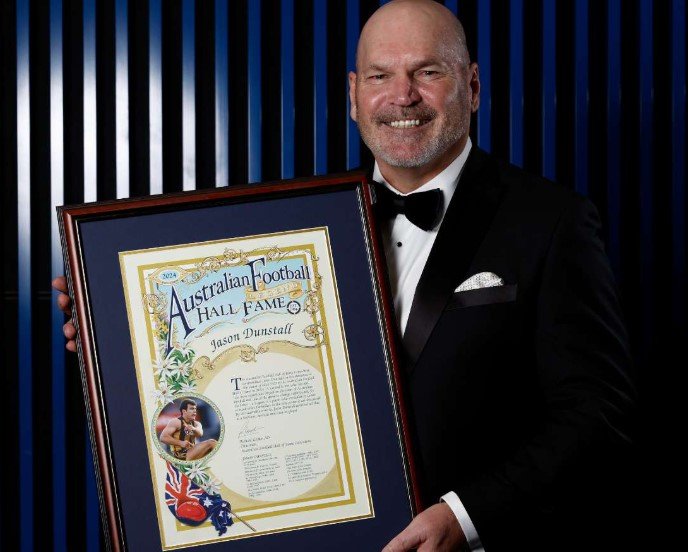AFLW trailblazers and forgotten legends from state leagues stood shoulder to shoulder in a celebration that stretched beyond the borders of the AFL.
The 30th Australian Football Hall of Fame didn’t just honour elite athletes. It cracked open a deeper, more inclusive history — one where the game’s heart beats just as loudly in Hobart, Perth and Adelaide as it does in Melbourne. And for the first time, two women stood in the glow of the Hall’s highest honour.
This wasn’t just a night of applause. It was a statement. Football’s identity is no longer confined to men in Victoria. It’s become a shared space. A bigger, louder, more textured story.
Old heroes, new voices, and a redefined legacy
The room was full of stories — stories that had waited long enough to be heard.
There was the “little fat kid from Colac” who went on to become a five-time All Australian. A man from Tasmania widely seen as one of the best footballers to never play on the mainland. A giant of a South Australian, part philosopher, part comedian, who shrugged and said, “Football was just something I did on Saturdays.”
These aren’t footnotes. These are the main acts, finally getting their names in lights.
Then came the player who took more marks than anyone in VFL/AFL history — and the WAFL warhorse who not only won seven premierships but went on to umpire five grand finals. That’s not just longevity. That’s living and breathing the game across generations.
One of the biggest cheers was for a Depression-era goalkicking machine from South Australia — a man whose boots were never televised but whose feats still echo in dusty clubrooms and pub banter.

Erin Phillips stood tall — again
And then the room got quiet.
Erin Phillips walked on stage, taking her place as one of the first AFLW inductees. A dual WNBA champion. An Olympian. A basketball world champion. But to many in that room, this was her biggest victory.
Until 2016, the idea that women could play Australian football at a professional level was basically fantasy. That didn’t stop her. And it didn’t stop her dad, Greg Phillips, from dreaming on her behalf.
He’d been inducted himself years earlier — a Port Adelaide legend, with thighs so sturdy people joked they could hold up a bridge. Last night, he broke down.
“I never wanted to be a boy,” Erin said. “I just wanted the opportunities they had — and that was footy.”
That line landed like a hammer wrapped in velvet.
Breaking through the grass ceiling
It wasn’t just a personal moment. It was political.
For decades, girls across the country were told they could play footy… until about 13. After that? Pack up your boots.
Now?
-
They’ve got a national league.
-
They’ve got role models.
-
They’ve got seats at the Hall of Fame.
What was once “a boy’s game” has been redefined by players like Phillips. She didn’t just break into the room. She brought an army in with her.
And this wasn’t some token gesture. This was overdue recognition. Phillips didn’t get in because the AFL needed diversity points. She earned it the hard way — in bruises, cross-training, late-night flights, and quiet sacrifices.
A national game, finally treated like one
Something else changed this year: the AFL’s Victorian filter cracked wide open.
In previous years, the Hall of Fame had leaned heavily into the VFL-AFL pipeline. But last night, it felt different.
Football in South Australia, Western Australia, and Tasmania got its due. The old state leagues — once the backbone of Aussie rules — stood proud again. And the fans in those states noticed.
It’s not about tokenism. It’s about accuracy. Football didn’t start with the AFL. It didn’t live only on the MCG. And it sure didn’t belong to one postcode.
Why nights like this still matter
Let’s be honest — the AFL is a juggernaut. It sells out stadiums, dominates airwaves, and pumps money through 18 clubs with military efficiency. But beneath all that glitz and noise, there’s still soul.
That’s what the Hall of Fame reminded people of: The soul.
It’s in the muddy Saturday afternoon games.
It’s in the old blokes at the canteen, telling tall tales about ‘85.
It’s in the girls who now grow up knowing they can go all the way.
There was one moment last night that really hit it.
An old South Australian inductee stepped up, smiled, and said: “I was never fast. Never fit. But every week, I had the time of my life.”
That’s what this sport is when you peel back the million-dollar TV deals and trademarked slogans. It’s people. It’s passion. It’s perseverance.







